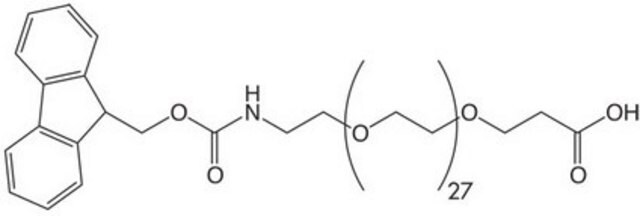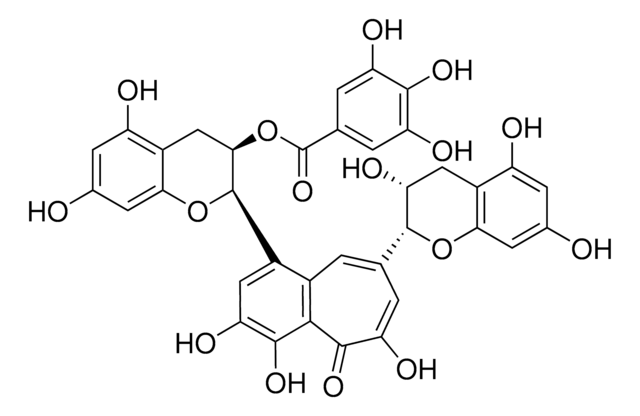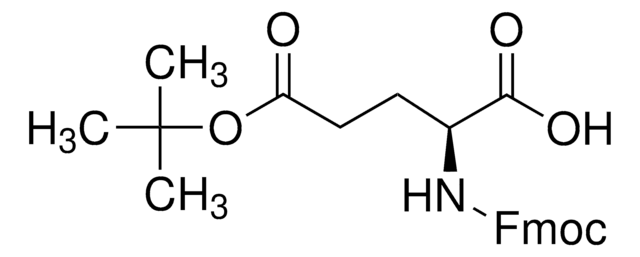QBD10273
Fmoc-N-amido-dPEG®8-acid
>95% (HPLC)
Sinônimo(s):
Fmoc-N-amido-PEG8-COOH, Fmoc-N-amido-PEG8-acid, Fmoc-NH-PEG8-acid, Fmoc-PEG-acid
Faça loginpara ver os preços organizacionais e de contrato
About This Item
Fórmula empírica (Notação de Hill):
C34H49NO12
Peso molecular:
663.75
Número MDL:
Código UNSPSC:
12352106
NACRES:
NA.22
Produtos recomendados
Ensaio
>95% (HPLC)
Formulário
solid or viscous liquid
adequação da reação
reaction type: Pegylations
arquitetura do polímero
shape: linear
functionality: heterobifunctional
Condições de expedição
ambient
temperatura de armazenamento
−20°C
Características e benefícios
Fmoc-N-amido-dPEG8-acid is a monodisperse PEG product that is useful for peptide synthesis. The 28-atom dPEG spacer allows the introduction of a medium-length, hydrophilic spacer onto either end of a peptide chain or between two peptide chains. The flexible dPEG spacer conjugates to peptides using conventional peptide synthesis chemistry. Peptide PEGylation imparts water solubility to hydrophobic peptide chains. Also, PEGylated peptides have expanded hydrodynamic volumes, which can reduce or eliminate renal clearance, and are protected from proteolysis. The combination of decreased renal clearance and protection from proteolysis contributes to longer in vivo circulation times for PEGylated (as compared to non-PEGylated) peptides. Additionally, PEGylation diminishes a peptide′s antigenicity. This product is part of the Fmoc-N-amido-dPEGn-acid (n=2, 3, 4, 5, 6, 8, 12, 24, 36) product series.
Informações legais
Products Protected under U.S. Patent #s 7,888,536 & 8,637,711 and European Patent #s 1,594,440 & 2,750,681
dPEG is a registered trademark of Quanta BioDesign
Código de classe de armazenamento
11 - Combustible Solids
Classe de risco de água (WGK)
WGK 3
Ponto de fulgor (°F)
Not applicable
Ponto de fulgor (°C)
Not applicable
Escolha uma das versões mais recentes:
Certificados de análise (COA)
Lot/Batch Number
Lamentamos, não temos COA para este produto disponíveis online no momento.
Se precisar de ajuda, entre em contato Atendimento ao cliente
Já possui este produto?
Encontre a documentação dos produtos que você adquiriu recentemente na biblioteca de documentos.
Guangchang Zhou et al.
Molecular bioSystems, 8(9), 2395-2404 (2012-07-10)
Robust methods for highly parallel, quantitative analysis of cellular protein tyrosine kinase activities may provide tools critically needed to decipher oncogenic signaling, discover new targeted drugs, diagnose cancer and monitor patients. Here, we describe proof-of-principle for a novel protein kinase
Ignacio Melgar-Asensio et al.
Investigative ophthalmology & visual science, 59(10), 4071-4081 (2018-08-12)
Drug delivery by intravitreal injection remains problematic, small agents and macromolecules both clearing rapidly. Typical carriers use microparticles (>2 μm), with size-related liabilities, to slow diffusion. We recently described cationic nanoparticles (NP) where conjugated Arg peptides prolonged residence in rat
Ian W Hamley
Biomacromolecules, 15(5), 1543-1559 (2014-04-12)
The remarkable diversity of the self-assembly behavior of PEG-peptides is reviewed, including self-assemblies formed by PEG-peptides with β-sheet and α-helical (coiled-coil) peptide sequences. The modes of self-assembly in solution and in the solid state are discussed. Additionally, applications in bionanotechnology
Nossa equipe de cientistas tem experiência em todas as áreas de pesquisa, incluindo Life Sciences, ciência de materiais, síntese química, cromatografia, química analítica e muitas outras.
Entre em contato com a assistência técnica








